Notebandi fails to unite !
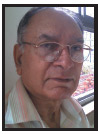 N D Sharma
Ma d h y a
P r a d e s h
C o n g r e s s
C o m m i t t e e
p r e s i d e n t
Arun Yadav
had called a meeting of party
leaders on January 3 to finalise
the preparations for the proposed
anti-notebandi demonstrations in
the State, as part of the
nationwide stir planned by the
party's central leadership. AICC
general secretary in-charge of
Madhya Pradesh affairs Mohan
Prakash had arrived a day earlier
to ensure an impressive show by
the party.
N D Sharma
Ma d h y a
P r a d e s h
C o n g r e s s
C o m m i t t e e
p r e s i d e n t
Arun Yadav
had called a meeting of party
leaders on January 3 to finalise
the preparations for the proposed
anti-notebandi demonstrations in
the State, as part of the
nationwide stir planned by the
party's central leadership. AICC
general secretary in-charge of
Madhya Pradesh affairs Mohan
Prakash had arrived a day earlier
to ensure an impressive show by
the party.
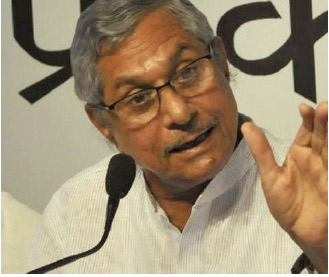 Mohan Prakash
All party candidates in the 2014
Lok Sabha poll and all party MLAs,
along with district Congress
presidents and coordinators were
invited. Yadav's invitation was
ignored by veterans including
Digvijaya Singh, Kamal Nath,
Jyotiraditya Scindia, and their supporters. Only Kantilal Bhuria
turned up out of the Lok Sabha
candidates. And not even 50 per
cent of the MLAs came.
Mohan Prakash
All party candidates in the 2014
Lok Sabha poll and all party MLAs,
along with district Congress
presidents and coordinators were
invited. Yadav's invitation was
ignored by veterans including
Digvijaya Singh, Kamal Nath,
Jyotiraditya Scindia, and their supporters. Only Kantilal Bhuria
turned up out of the Lok Sabha
candidates. And not even 50 per
cent of the MLAs came.
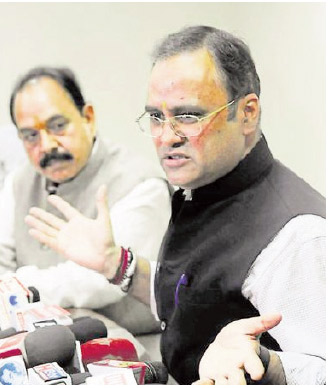 Arun Yadav
Needless to say it was a
ludicrously poor show by the
party on January 6. Wherever
Congress activists and supporters
did appear on the road to express their disapproval of the
demonetisation, they did so not
as party workers but as loyalists
of individual leaders.
Arun Yadav
Needless to say it was a
ludicrously poor show by the
party on January 6. Wherever
Congress activists and supporters
did appear on the road to express their disapproval of the
demonetisation, they did so not
as party workers but as loyalists
of individual leaders.
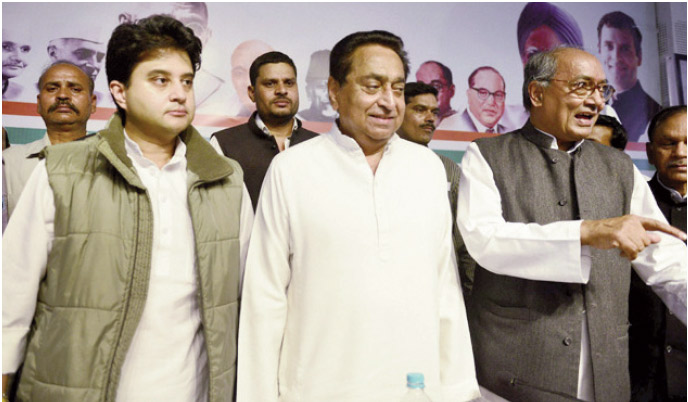 Jyotiraditya Scindia, Kamal Nath and Digvijaya Singh
Two different groups, for instance, demonstrated in Ujjain.
One group calling itself as
'wafadar Congressis' (apparently
owing loyalty to the PCC chief)
took out a Janakrosh rally. The
other group led by former MP
Premchand Guddu held a
Janakrosh Sabha separately.
Similar was the scene at other
places. For all practical purposes,
Congress in Madhya Pradesh has
long ceased to be a cohesive
political party. It is like a
conglomeration of several
factions, often pulling down one
a n o t h e r
instead of
f i g h t i n g
against the
anti-people
actions of the
government.
Jyotiraditya Scindia, Kamal Nath and Digvijaya Singh
Two different groups, for instance, demonstrated in Ujjain.
One group calling itself as
'wafadar Congressis' (apparently
owing loyalty to the PCC chief)
took out a Janakrosh rally. The
other group led by former MP
Premchand Guddu held a
Janakrosh Sabha separately.
Similar was the scene at other
places. For all practical purposes,
Congress in Madhya Pradesh has
long ceased to be a cohesive
political party. It is like a
conglomeration of several
factions, often pulling down one
a n o t h e r
instead of
f i g h t i n g
against the
anti-people
actions of the
government.
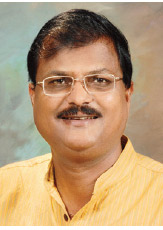 Premchand Guddu
The fable
of the
w a n d e r i n g
dog, narrated
by then Chief
Minister Digvijaya Singh to
describe the situation in the
Madhya Pradesh Congress two decades ago, still holds true about
the party. It was in 1997 at Indore
where the party's political
conference was held. All top
leaders were present. The fable
was that a dog, on a journey, was
hounded by its own community
but taken good care of by others.
He ended it with the plea, in the
presence of then Congress
president Sitaram Kesri: 'we can
deal with our enemies; you only
save us from our friends'
Premchand Guddu
The fable
of the
w a n d e r i n g
dog, narrated
by then Chief
Minister Digvijaya Singh to
describe the situation in the
Madhya Pradesh Congress two decades ago, still holds true about
the party. It was in 1997 at Indore
where the party's political
conference was held. All top
leaders were present. The fable
was that a dog, on a journey, was
hounded by its own community
but taken good care of by others.
He ended it with the plea, in the
presence of then Congress
president Sitaram Kesri: 'we can
deal with our enemies; you only
save us from our friends'
Lack of interest on the
part of the high command
is the main reason for the
degeneration of Congress
in Madhya Pradesh.
Leader of Opposition in
the State Assembly
Satyadev Katare died in
October last year after a
prolonged illness. Winter
session of the Assembly
has, meanwhile, passed.
The Congress high
command has not so far
'named' a new Leader of
Congress Legislature Party.
Digvijaya Singh had spoken
immediately after Madhavrao
Scindia who had referred to the
lack of rapport between the ruling
Congress party and the people.
Not only Scindia but Arjun Singh,
too, seemed to have taken
offence at Digvijaya Singh's fable
because Arjun Singh also had
criticised the way the State
government was functioning).
Many years later, Digvijaya
Singh himself hounded the
'wandering dog'. When Arun
Yadav was made PCC chief three
years ago, he started his job with
apparent enthusiasm. At the first meeting of PCC, Jagdish Yadav,
PCC secretary and a friend of
Arun Yadav, described as
inauspicious the mention of the
name of Digvijaya Singh (who was
in Delhi). For this Jagdish Yadav
was suspended and served a
show-cause notice, which gave a
clear message to the party
workers that new PCC chief Arun
Yadav would not tolerate
'indiscipline' by any party leader
or worker, even though he may be
his personal friend.
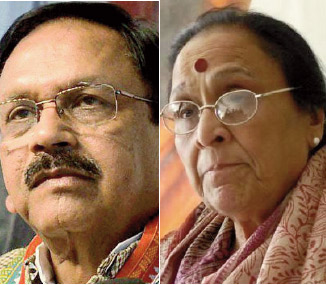 Suresh Pachouri and Jamuna Devi
However, before the day was
out, Digvijaya Singh called Arun
Yadav (and also made it public)
that suspension of Jagdish Yadav
should be revoked as he (Jagdish
Yadav) was a dedicated
Congressman. Many
Congressmen were surprised to
know Digvijaya Singh's latest
views about Jagdish Yadav
because the Raja of Raghogqrh
was never known to have liked
Jagdish Yadav or any Yadav for
that matter. Thus snubbed
publicly even for working in the
party interest, Arun Yadav lost
whatever zeal he had and started
on the safe path of running his
own faction in the party and, in
the process. Inviting unsavoury allegations. The party high
command was not concerned.
Suresh Pachouri and Jamuna Devi
However, before the day was
out, Digvijaya Singh called Arun
Yadav (and also made it public)
that suspension of Jagdish Yadav
should be revoked as he (Jagdish
Yadav) was a dedicated
Congressman. Many
Congressmen were surprised to
know Digvijaya Singh's latest
views about Jagdish Yadav
because the Raja of Raghogqrh
was never known to have liked
Jagdish Yadav or any Yadav for
that matter. Thus snubbed
publicly even for working in the
party interest, Arun Yadav lost
whatever zeal he had and started
on the safe path of running his
own faction in the party and, in
the process. Inviting unsavoury allegations. The party high
command was not concerned.
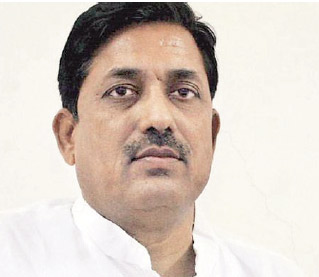 Satyadev Katare
When Suresh Pachouri was the
PCC chief in Madhya Pradesh (2008-11), Jamuna Devi was the
Leader of Opposition. A rival
Congress leader of Jamuna Devi
from her Dhar district brought
200 persons to Bhopal. They held
a demonstration against Jamuna
Devi and submitted a
memorandum to Pachouri
seeking removal of Jamuna Devi.
Pachouri entertained them
properly, gladly accepted the
memorandum and assured them
that he would take it to the
Congress president. Irrespective
of whether he took the
memorandum to the Congress
president, the party high
command never tried to stem the
riot. The two continued in their
separate ways, often working
against each other. However,
Jamuna Devi (since deceased) never betrayed the party
interests. Pachouri did with
impunity.
Satyadev Katare
When Suresh Pachouri was the
PCC chief in Madhya Pradesh (2008-11), Jamuna Devi was the
Leader of Opposition. A rival
Congress leader of Jamuna Devi
from her Dhar district brought
200 persons to Bhopal. They held
a demonstration against Jamuna
Devi and submitted a
memorandum to Pachouri
seeking removal of Jamuna Devi.
Pachouri entertained them
properly, gladly accepted the
memorandum and assured them
that he would take it to the
Congress president. Irrespective
of whether he took the
memorandum to the Congress
president, the party high
command never tried to stem the
riot. The two continued in their
separate ways, often working
against each other. However,
Jamuna Devi (since deceased) never betrayed the party
interests. Pachouri did with
impunity.
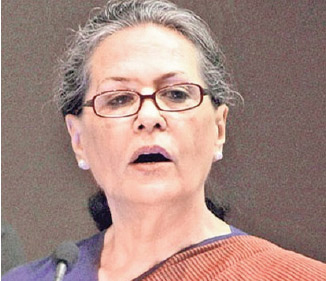 Sonia Gandhi
Lack of interest on the part of
the high command is the main
reason for the degeneration of
Congress in Madhya Pradesh.
Leader of Opposition in the State
Assembly Satyadev Katare died in
October last year after a
prolonged illness. Winter session
of the Assembly has, meanwhile,
passed. The Congress high
command has not so far 'named' a
new Leader of Congress
Legislature Party.
Sonia Gandhi
Lack of interest on the part of
the high command is the main
reason for the degeneration of
Congress in Madhya Pradesh.
Leader of Opposition in the State
Assembly Satyadev Katare died in
October last year after a
prolonged illness. Winter session
of the Assembly has, meanwhile,
passed. The Congress high
command has not so far 'named' a
new Leader of Congress
Legislature Party.
This 'naming' of the Leader has
also become a scandal in the
Congress. Under Sonia Gandhi's dispensation, legislators have
nothing to do with the election of
their Leader. The rules prescribe
that a meeting of the party MLAs
will be
convened
for the
election of
the Leader.
A formal
resolution
will be
a d o p t e d
for the
p u r p o s e .
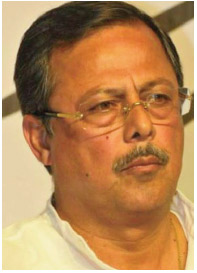 Ajay Singh
E l e c t i o n
may be unanimous or by a
majority vote. The copy of the
resolution will be communicated
to the Speaker of the Assembly in
a prescribed manner. The Speaker
announces his approval in the
Assembly. Then only he/she
becomes Leader of Opposition.
Ajay Singh
E l e c t i o n
may be unanimous or by a
majority vote. The copy of the
resolution will be communicated
to the Speaker of the Assembly in
a prescribed manner. The Speaker
announces his approval in the
Assembly. Then only he/she
becomes Leader of Opposition.
In Madhya Pradesh, an
observer of AICC or the AICC
general secretary in charge of
Madhya Pradesh gets signatures
of party MLAs on a single-line
resolution authorising Sonia
Gandhi to name the Leader. The
general secretary in-charge then
gets the signature of Sonia
Gandhi for a particular name and a copy of that is sent to the
Speaker somehow and Speaker
promptly gives his approval. This
happened in the last Assembly
(after 2008 elections) when Ajay
Singh was the 'Leader of
Opposition' and this happened in
the post-2013 elections Assembly
when Satyadev Katare was made
the 'Leader of Opposition'.
On both the occasions, even
after getting Sonia Gandhi's
The Congress workers,
who were led to believe
before the Assembly
elections that the Shivraj
Singh Chouhan
government was on its
way out, were naturally
demoralised as the
Congress failed to win
even as many seats as it
had in 2008.
approval it was not felt necessary
to convene a meeting of party
MLAs to fulfil the formality of
adopting the required resolution.
If the Speaker did not point out
the irregularities in 'election' of
the Leader and in communication
to the Speaker, it was because it
suited the ruling BJP. The MLAs do
not give due regard to the Leader
because they feel they were not
directly involved even in the socalled
election; the Leader is
happy to get his substantial perks
as Leader of Opposition, hobnobs
with the ruling bosses who are
always eager to please him and
his small coterie.
MLAs work almost
independently in the Assembly,
sometimes even working at cross
purposes. Occasionally the
meetings of Legislature Party are convened to discuss the 'party
strategy' in the House but only
rarely a concerted effort of the
party was seen to corner the
government.
Here is an example of how the
PCC in Madhya Pradesh functions.
A day after the polling for the
Madhya Pradesh Assembly was
over on November 25 (2013), the
State Congress announced
appointment of a dozen officebearers
of the PCC. A few days
earlier, when the campaign was
on its last leg, a large number of
PCC spokesmen were appointed
without any specific brief or
assignment. That, in a way,
reflected the State of the
Congress on the eve of the
Assembly elections. Little wonder
that the Congress was all but
decimated in the elections for the
third time in a row.
The Congress workers, who
were led to believe before the
Assembly elections that the
Shivraj Singh Chouhan
government was on its way out,
were naturally demoralised as the
Congress failed to win even as
many seats as it had in 2008.
Their demoralisation deepened
when AICC general secretary and
former Chief Minister Digvijaya
Singh quietly turned up to file his
nomination papers for Rajya
Sabha for the lone seat that the
Congress could win on the basis
of its strength in the Assembly.
Digvijaya Singh had always
mocked at those who entered
Parliament through the 'back
door'. His decision to run away
from a contest had sent the
inevitable message to the party's
workers and supporters that
there was no hope for the
Congress in near future.




 N D Sharma
N D Sharma Mohan Prakash
Mohan Prakash Arun Yadav
Arun Yadav Jyotiraditya Scindia, Kamal Nath and Digvijaya Singh
Jyotiraditya Scindia, Kamal Nath and Digvijaya Singh Premchand Guddu
Premchand Guddu Suresh Pachouri and Jamuna Devi
Suresh Pachouri and Jamuna Devi Satyadev Katare
Satyadev Katare Sonia Gandhi
Sonia Gandhi Ajay Singh
Ajay Singh